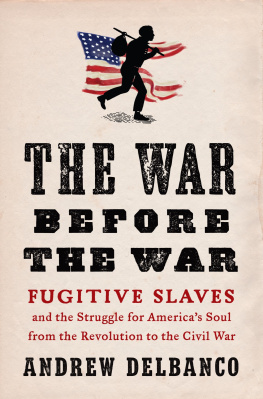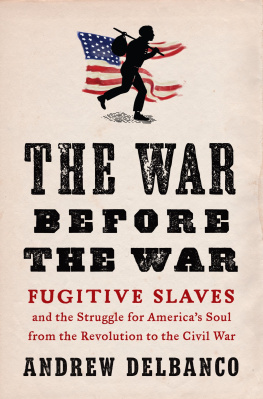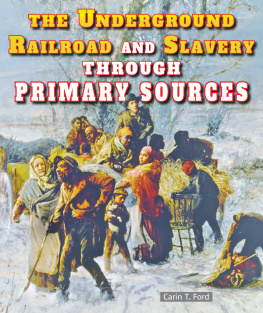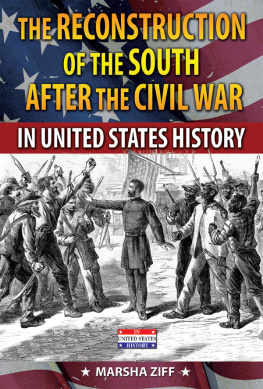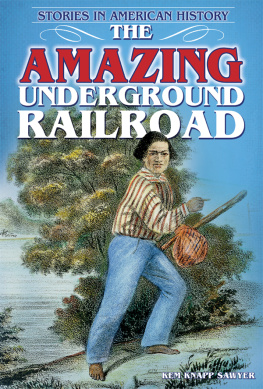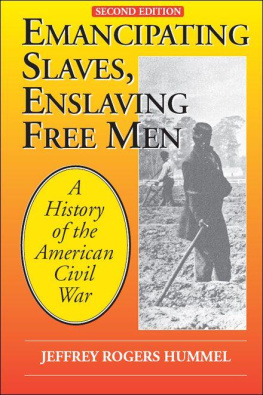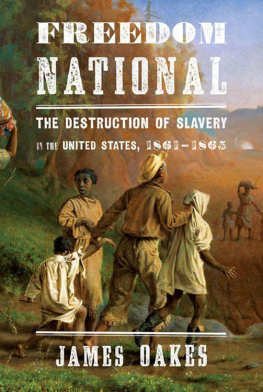South to Freedom reorders the way we should think and teach about the slavery expansion crisis in the middle of the nineteenth century. Indeed, it reorders how to think about the huge question of the coming of the American Civil War. Not many books these days can make that claim. With astonishing research and graceful writing, this one can.
D AVID W. B LIGHT , Pulitzer Prizewinning author of Frederick Douglass: Prophet of Freedom
Taken for granted, borders between two nations have the power to constrain curiosity and limit the self-understanding of both nations. But when the research of a gifted historian defies a border, as Alice L. Baumgartners South to Freedom demonstrates, the result is the revelation of a story of great consequence. When Texas slaves seized the opportunities presented by Mexicos precedent-setting initiatives in emancipation, the actions of a comparatively small group of people shaped a historical event of enormous scale: the American Civil War.
P ATRICIA N ELSON L IMERICK , author of The Legacy of Conquest: The Unbroken Past of the American West
Enslaved freedom-seekers in the antebellum United States looked not only to the North Star, but also to the southern border with Mexico. In a fast-paced narrative that moves deftly between the histories of both countries, Alice L. Baumgartner demonstrates the far-reaching impact of Mexicos free-soil policies. She shows, with eloquence and insight, how enslaved people themselves ignited the fuse that led to a civil warand the final abolition of slavery on the North American continent.
W. C ALEB M C D ANIEL , Pulitzer Prizewinning author of Sweet Taste of Liberty: A True Story of Slavery and Restitution in America
In this deeply researched and pathbreaking study of southern slaves who escaped to Mexico and carved out new lives in the decades prior to the Civil War, Alice L. Baumgartner has succeeded in explaining a mystery that historians had been unable to unravel. How many slaves ran South to freedom, rather than North, and how did their assertiveness influence the coming of the Civil War? Baumgartner explores not only the familiar sectional controversy that led the southern states to secede from the union, but more importantly, South to Freedom examines the rich and complicated lives and the multifaceted roles that enslaved people played in Mexico. This book will contribute immensely to our understanding of sectional politics, as well as the manner in which Mexico asserted its moral power to reject an inhumane institution and to assist fugitive slaves in recreating their lives as free men and women.
A LBERT S. B ROUSSARD , author of Black San Francisco: The Struggle for Racial Equality in the West, 190054
Copyright 2020 by Alice L. Baumgartner
Cover design by Ann Kirchner
Cover images: GRANGER; Textures and backgrounds / Shutterstock.com
Cover copyright 2020 Hachette Book Group, Inc.
Hachette Book Group supports the right to free expression and the value of copyright. The purpose of copyright is to encourage writers and artists to produce the creative works that enrich our culture.
The scanning, uploading, and distribution of this book without permission is a theft of the authors intellectual property. If you would like permission to use material from the book (other than for review purposes), please contact permissions@hbgusa.com. Thank you for your support of the authors rights.
Basic Books
Hachette Book Group
1290 Avenue of the Americas, New York, NY 10104
www.basicbooks.com
First Edition: December 2020
Published by Basic Books, an imprint of Perseus Books, LLC, a subsidiary of Hachette Book Group, Inc. The Basic Books name and logo is a trademark of the Hachette Book Group.
The Hachette Speakers Bureau provides a wide range of authors for speaking events. To find out more, go to www.hachettespeakersbureau.com or call (866) 376-6591.
The publisher is not responsible for websites (or their content) that are not owned by the publisher.
Library of Congress Cataloging-in-Publication Data
Names: Baumgartner, Alice, 1987 author.
Title: South to freedom : runaway slaves to Mexico and the road to the Civil War / Alice L. Baumgartner.
Description: New York : Basic Books, [2020] | Includes bibliographical references and index.
Identifiers: LCCN 2020011978 | ISBN 9781541617780 (hardcover) | ISBN 9781541617773 (ebook)
Subjects: LCSH: Fugitive slavesMexicoHistory19th century. | Fugitive slavesUnited StatesHistory19th century. | SlaveryMexicoHistory19th century. | SlaveryUnited StatesHistory19th century. | United StatesHistoryCivil War, 18611865Causes.
Classification: LCC HT1053 .B38 2020 | DDC 306.3/62dc23
LC record available at https://lccn.loc.gov/2020011978
ISBNs: 978-1-5416-1778-0 (hardcover), 978-1-5416-1777-3 (ebook)
E3-20201020-JV-NF-ORI
TO MY TEACHERS
The road would always be open to Mexico.
F REDERICK L AW O LMSTED
N O ONE KNEW HOW THE TWO SAILORS ESCAPEDWHETHER they risked swimming from the Metacomet, anchored in the deep water off the port of Veracruz, Mexico, or whether someone had rowed them to shore under cover of darkness. It was the summer of 1857, and the Metacomet was due back in its home port of New Orleans, where another shipment of cotton awaited transport to Mexican markets. But the steamship could not leave Veracruz without the two missing sailors, and the shipmaster had reason to fear that the men were gone for good. Although it had become routine for Mexican authorities to arrest seamen who broke their contracts, George and James Frisby were no ordinary deserters: they were black slavesbrothers, in facthired out by their owner in Louisiana.
If George and James Frisby had escaped in New York or Boston, they would have been returned, if captured, under the US Constitution and the Fugitive Slave Act, but Mexicos laws offered no such guarantees. Not only had Mexico abolished slavery, but its laws freed the slaves of other countries from the moment they set foot on its soil. To have any chance of returning the Frisby brothers, the shipmaster of the Metacomet avoided mentioning that the two men were black slaves. Assuming that the missing sailors were ordinary deserters, the local police promptly apprehended George. But his brother proved harder to find. As the police searched the streets and alleyways of Veracruz, James hid inside of a house. Nothing is known for certain about the house or its owners, though there is reason to believe that while in hiding, James learned about Mexicos antislavery laws. When the police finally found him, he did something that his brother did not: he claimed his freedomironicallyby producing evidence of his enslavement.
Since Mexican law abolished slavery and freed all slaves who set foot on its soil, the Commander of the Port of Veracruz refused to arrest James, even when the US ambassador to Mexico protested that the incident would undermine the increasing and beneficent commerce between Mexico and the US South. Much more was at stake than commercial relations. The freedom that Mexico promised would threaten slavery not just in the nearby states of Texas and Louisiana, but at the very heart of the Union.
T HERE WAS NO OFFICIAL U NDERGROUND R AILROAD TO M EXICO, only the occasional ally; no network, only a set of discrete, unconnected nodes. Some fugitive slaves received help while making their escapefrom free blacks, ship captains, Mexicans, Germans, gamblers, preachers, mail riders, and other lurking scoundrels. Most, though, escaped from the United States by their own ingenuity. They forged slave passes to give the impression that they were traveling with the permission of their masters. They disguised themselves as white men, fashioning wigs from horsehair and pitch. They stole horses, firearms, skiffs, dirk knives, fur hats, and, in one instance, twelve gold watches and a diamond breast pin. And then, while either gathering oysters or collecting firewood or walking to a camp meeting, they disappeared.


